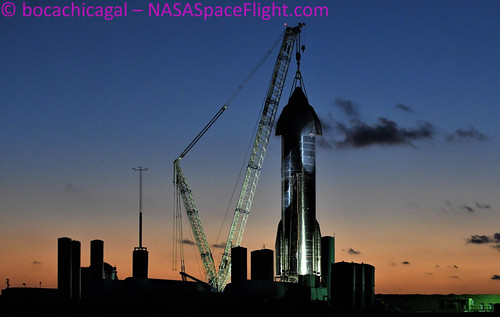Tonight Elon Musk and Chris Anderson have stretched my mind in some unexpected ways. Elon hopes we’ll see (and is working toward) a future within 10-20 years where SpaceX is launching 1000 Starships to Mars every two years, so we can establish a self-sustaining city of a million humans who will be able to carry human consciousness forward into the future even if an existential disaster (meteor strike, global thermonuclear war, climate change, etc.) destroys humanity on planet Earth. This isn’t a science fiction movie or an episode from “The Onion,” this is the actual future vision which Elon and SpaceX are actively working towards and building. The entire interview with Chris Anderson, recorded on April 17, 2022, is 66 minutes long. Start watching at 36:55 for the segment subtitled in the video description, “SpaceX’s Starship and the mission to build a city on Mars.”
As Chris points out in the interview, there are likely NOT many people today who have this vision of the next two decades… That thousands of “fully reusable spaceships” are going to not only be traveling to and from Earth to Mars, but also exploring other parts of our solar system and presenting both new opportunities as well as challenges most of us have only contemplated via science fiction tales.
In February this year, Shelly and I attended the “Space Exploration Educator’s Conference” at the Johnson Space Center in Houston in person. Shelly likes to tell her third grade STEM students they are “the Artemis generation,” since they are the generation of students who will not only witness but also have opportunities to PARTICIPATE in the Artemis Program which will return humans to the moon. I love to share my own enthusiasm for space exploration with my 5th and 6th grade media literacy students, but also discuss the vital NEED we have as a nation and a planet for their intelligence and their ethical leadership to help us figure out some very difficult challenges and make good decisions in a rapidly changing world filled with more computing technology, digital devices, and computer code than any previous era of human history.
Tonight as I listened to Elon and Chris talk about the prospects for enlightened governance on Mars (“It’s the people of Mars’ city.”) I was reminded of several things. Shelly and our son have watched all the episodes of the Netflix series, “The Expanse,” which is set a few hundred years into the future when humans are living on Mars and in the astroid belt, as well as on Earth. Like other good science fiction, “glimpses of the future” which we gain in different places (like tonight’s interview with Elon) make many aspects of “The Expanse” seem realistic and possible.
In addition, tonight’s interview made me think of Mark Wagner (@markwagner), who I saw again at SECC 2022 and know from the days of Google’s Infinite Thinking Machine blog and the Google Teacher Academy events. Mark’s Twitter profile reveals he’s now President of @thespaceprize, Founder of @areslearning, Faculty of @keplerspaceinst, and the author #MoreNow (“More Now: A Message from the Future for the Educators of Today.”)
The “About KSI” page explains:
Kepler Space Institute is dedicated to the expansion of human civilization from Earth into space. We believe this is necessary, both to acquire resources – based on the Law of Space Abundance to provide the fundamental needs of preserving peace and prosperity for humankind on this planet – and to extend life through our solar system and beyond.
About KSI – Kepler Space Institute. (n.d.). Retrieved April 26, 2022, from https://keplerspaceinstitute.com/who-we-are/
Amidst all the day-to-day stresses and challenges we each face, and the grim news from places like Ukraine, it can be hard sometimes to envision a future world of abundance and be optimistic about our shared future. Watching Elon’s interview tonight was an invigorating “shot in the arm” for me. I think this weekend may be a good time to open up the “Star Walk 2” app on my iPhone and do some backyard stargazing. We live in an amazing universe, and it’s exciting to think about all the ways different people are working to help us both explore and LIVE in more parts of it than ever before.
If you enjoyed this post and found it useful, subscribe to Wes’ free newsletter. Check out Wes’ video tutorial library, “Playing with Media.” Information about more ways to learn with Dr. Wesley Fryer are available on wesfryer.com/after.








More Stories
How Special Needs Advocates Empower Families
Why Special Needs Preschools Are Essential for Growth
Top Special Education Resources to Enhance Instruction